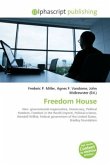In justice and law, house arrest (also called home confinement, home detention, or electronic monitoring) is a measure by which a person is confined by the authorities to his or her residence. Travel is usually restricted, if allowed at all. House arrest is a lenient alternative to prison time or juvenile-detention time. While house arrest can be applied to common criminal cases when prison does not seem an appropriate measure, the term is often applied to the use of house confinement as a measure of repression by authoritarian governments against political dissidents. In that case, typically, the person under house arrest does not have access to means of communication. If electronic communication is allowed, conversations will most likely be monitored. With certain units, the conversations of criminals can be monitored directly via the unit itself.
Bitte wählen Sie Ihr Anliegen aus.
Rechnungen
Retourenschein anfordern
Bestellstatus
Storno








